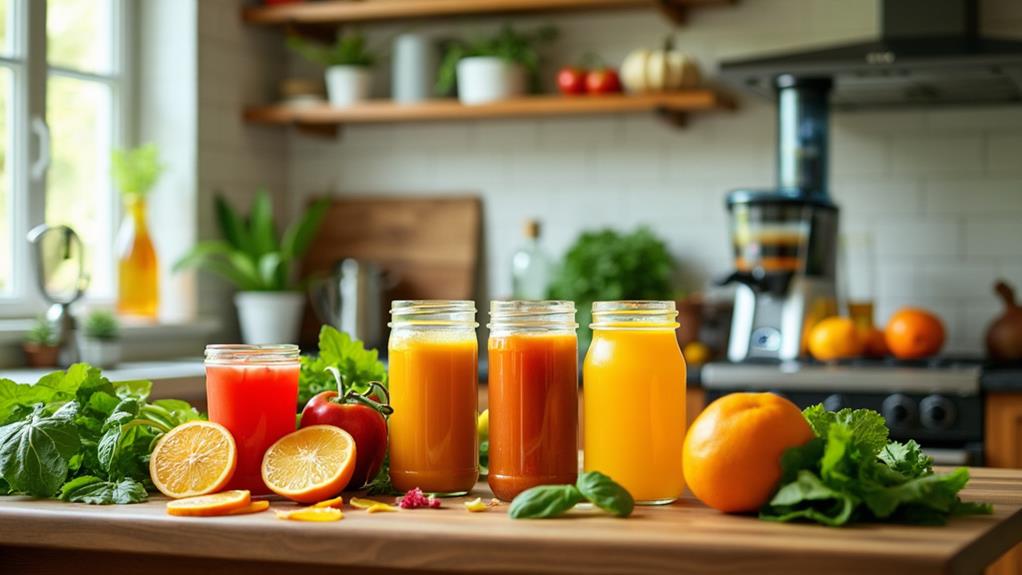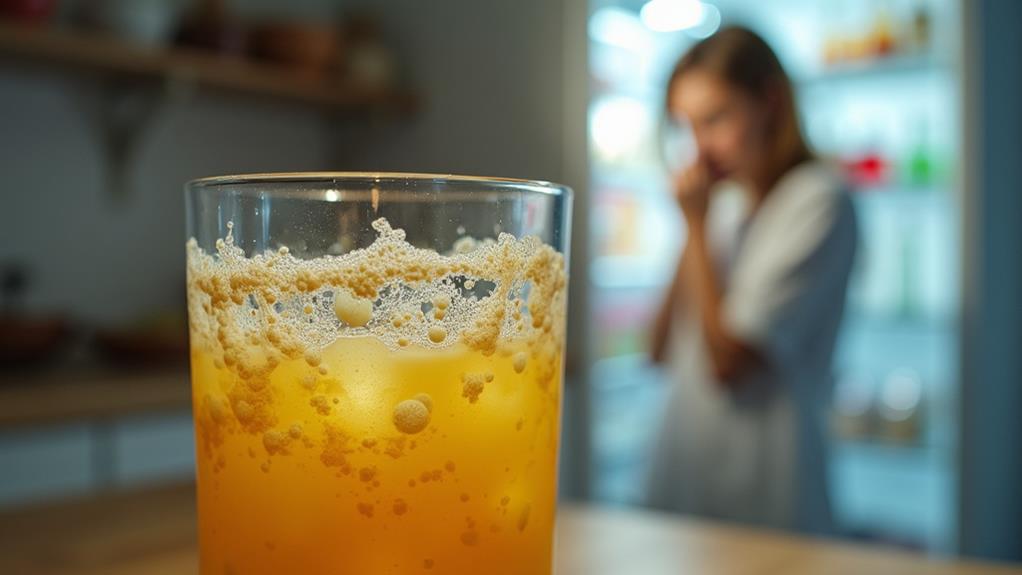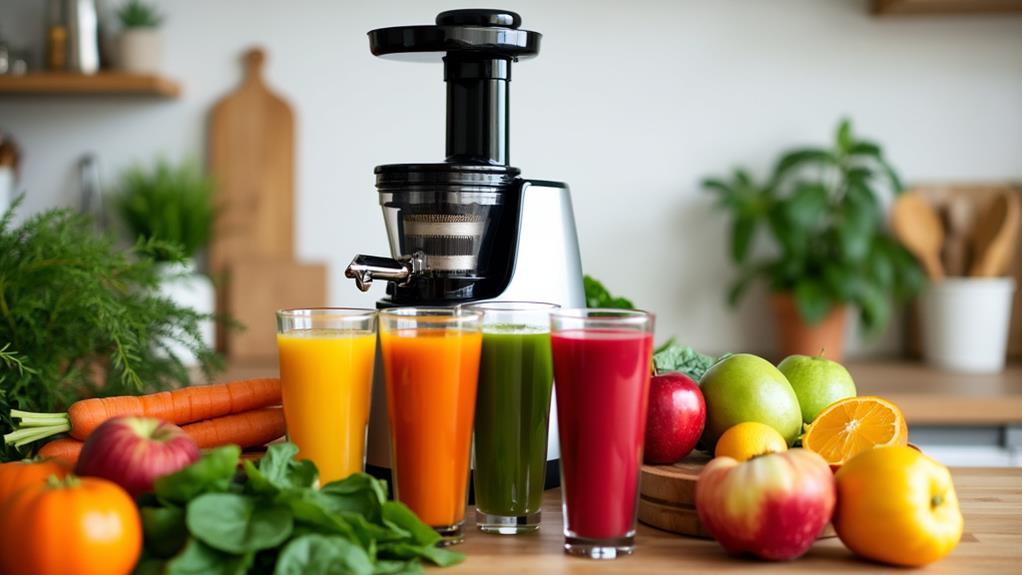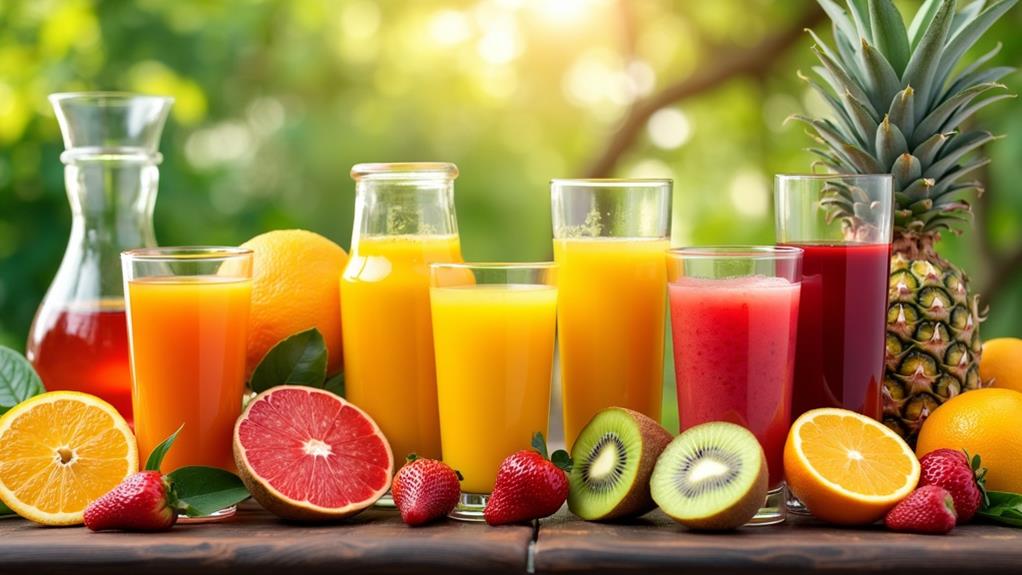Essential Tips for Keeping Juice Fresh
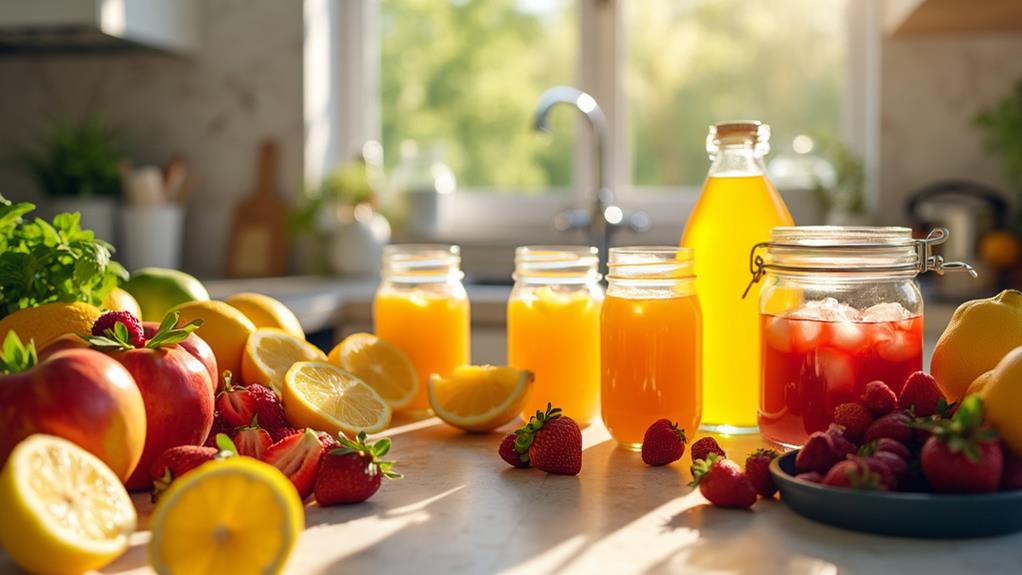
Preserving the freshness of your juice is crucial for maintaining its nutritional value. Storing juice in airtight glass containers immediately after preparation significantly reduces oxidation and nutrient loss. Additionally, adding a splash of lemon juice can slow down the degradation process. For extended storage, freezing juice properly is highly effective. Following these tips will help ensure your juice remains fresh and nutritious.
Juice Storage Duration
When storing fresh juice, it's essential to monitor the time to preserve its quality and nutritional benefits. Freshly squeezed juice can be stored in the refrigerator for 24-48 hours, with the maximum recommended storage time being 72 hours under ideal conditions. To maintain its nutrients, place the juice in an airtight container immediately after preparation and store it in a cool, dark place.
Juice begins to lose its nutritional value rapidly due to oxidation, with significant nutrient degradation occurring after the initial 48 hours. If stored for more than 72 hours, juice can lose nearly 80% of its original nutrients, and changes in color and flavor may also occur.
For longer storage, freezing is an effective option. By freezing juice, you can extend its shelf life to 12-16 months. When freezing, leave at least ½ inch of space in the container to allow for liquid expansion.
Immediate Storage Importance
For maximum nutrient retention, store your juice immediately after juicing in airtight glass containers. Fill the containers to the top to minimize oxidation and nutrient loss. This method ensures your juice remains fresh and maintains its health benefits for a longer period.
Prevent Nutrient Degradation
Nutrient degradation in juice begins quickly after juicing, necessitating immediate storage to retain its health benefits. Using airtight containers is crucial to minimize exposure to air, which leads to oxidation and nutrient loss. Fresh juice is most beneficial when consumed within 24-48 hours, as it retains its nutrient content best within this timeframe.
To enhance nutrient retention, consider adding citrus fruits like lemon or lime to your juice. These not only boost the Vitamin C content but also help reduce oxidation, thereby preserving the quality of your juice longer. Filling your storage containers as close to the top as possible minimizes the amount of oxygen inside, further preventing nutrient degradation.
Minimize Oxidation Exposure
To maintain the freshness of your juice, it is essential to minimize oxidation exposure, which begins immediately after juicing. To preserve its nutrient content and quality, store the juice as soon as possible. Oxidation, caused by air exposure, rapidly degrades nutrients. Using airtight glass containers significantly reduces exposure to air, heat, and light—all of which accelerate oxidation.
Fill containers close to the top to minimize oxygen interaction, preserving nutrient integrity. Adding a splash of citrus, such as lemon or lime, enhances Vitamin C content and antioxidants, further protecting against oxidation.
For optimal nutrient retention, consume fresh juice within 24 to 48 hours. Juices stored beyond 72 hours can lose nearly 80% of their nutritional value due to oxidation. By taking these steps immediately after juicing, you can reduce oxygen exposure and enjoy the full health benefits of your fresh juice.
Reducing Nutrient Loss
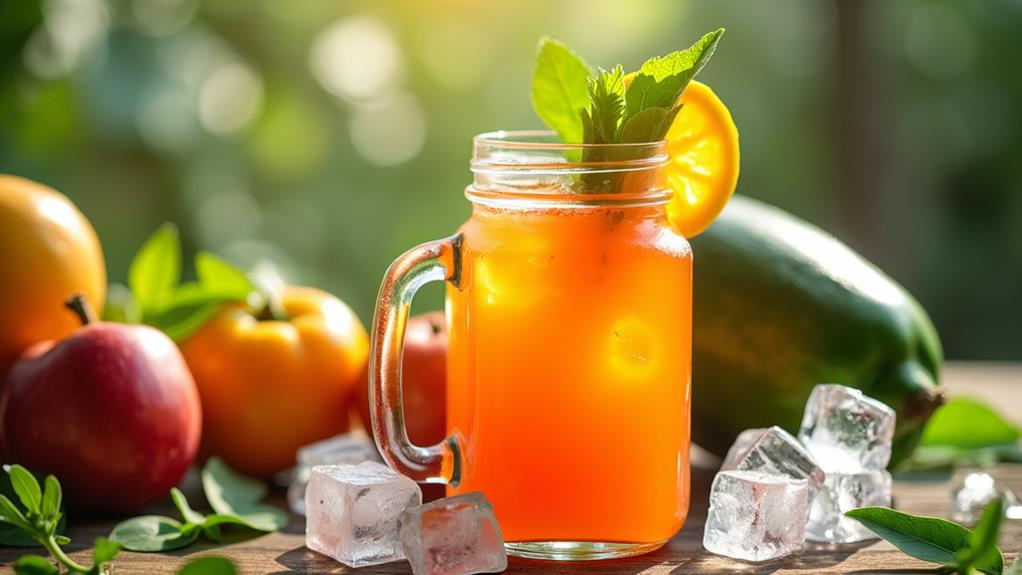
Keeping your juice fresh and nutrient-rich can be challenging, but with a few practical steps, it's achievable. To reduce nutrient loss, immediately store your freshly prepared juices in airtight glass containers. This practice minimizes exposure to air, heat, and light—key factors in nutrient degradation. Filling the containers to the top limits oxygen exposure, reducing oxidation and preserving the juice's quality for longer.
Incorporating citrus fruits like lemon or lime can enhance the Vitamin C content and boost antioxidants, which help slow down oxidation. For optimal nutrient retention, consume your juices within 24-48 hours, as nutrient levels decline significantly over time. Using vacuum-sealed containers can further prevent nutrient loss by eliminating air contact, thereby extending the shelf life of freshly squeezed juices.
Here are some crucial tips:
- Use airtight glass containers to store your juices.
- Fill containers to the top to limit exposure to air.
- Add citrus fruits like lemon or lime for extra Vitamin C and antioxidants.
- Consume juices within 24-48 hours for ideal nutrient retention.
Understanding Oxidation
Oxidation is a crucial process to understand when it comes to maintaining the freshness and nutrient density of your juice. During juicing, cell walls are broken down, exposing nutrients to air and accelerating oxidation. This chemical reaction leads to nutrient degradation and a decline in the quality of your juice over time. Additionally, heat and light can hasten this process, making immediate storage essential.
Homemade juice may lose its vibrant color and fresh flavor if not stored properly, a result of oxidation. This not only diminishes nutrient content but also increases the risk of unhealthy bacterial growth. To mitigate this, adding citrus fruits like lemon or lime can be beneficial. These fruits are high in Vitamin C and antioxidants, which slow down oxidation and help preserve the nutritional value of your juice.
Proper storage is also crucial. Use airtight containers to minimize air exposure and refrigerate your juice immediately. By understanding oxidation and implementing these measures, you can ensure that your homemade juice remains fresh and nutrient-rich, maximizing the health benefits of your juicing efforts.
Equipment Recommendations
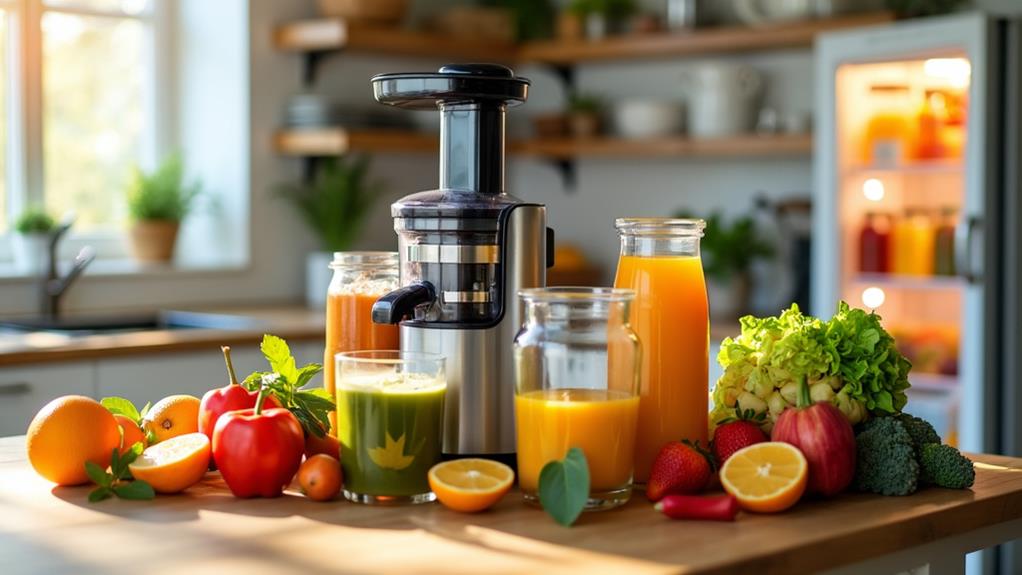
To keep your juice fresh, invest in a high-quality juicer such as the Nama Cold Press Juicer Vitality 5800 or the Hurom H-AA 3rd Generation Alpha Series. For storage, use BPA-free vacuum containers and glass airtight bottles to prevent oxidation and maintain freshness. Regularly cleaning your equipment is essential to ensure the best juice quality.
Proper Storage Containers
To keep your juice fresh and nutrient-rich, choosing the right storage containers is crucial. Opt for airtight glass containers to preserve nutrient quality and minimize oxygen exposure. Glass is superior to plastic as it doesn't leach chemicals and maintains the juice's integrity.
For optimal results, fill your glass containers close to the top to reduce air space, minimizing oxidation and nutrient degradation. If you frequently access your juice, use small glass containers for single servings to limit air exposure each time you open one.
BPA-free vacuum containers are another excellent choice. By eliminating air exposure, these containers significantly extend your juice's shelf life. Mason jars with rubber lids are particularly effective, offering an extra layer of protection against oxidation, potentially adding up to two extra days of freshness.
Cleaning and Maintenance
Regular cleaning and maintenance of your juicer are essential for its longevity and the quality of your juice. Immediately after use, disassemble your juicer and clean each component to prevent residue buildup, which can lead to bacterial growth and compromise taste and safety. Use warm, soapy water and a soft brush, focusing on small crevices and screens where pulp accumulates.
For masticating juicers, start by rinsing parts in cold water to remove juice remnants, then wash with soap. This practice helps prevent clogging and maintains peak performance. Regularly checking for wear and tear on blades and seals is crucial for prolonging your juicer's life and ensuring it operates at maximum extraction efficiency.
Investing in a high-quality juicer like the Nama Cold Press Juicer Vitality 5800, known for its easy disassembly and cleaning features, can make maintenance more convenient. To keep your juicer in top shape, remember these tips:
- Disassemble and clean immediately after use
- Use warm, soapy water and a soft brush
- Rinse parts in cold water first for masticating juicers
- Regularly check for wear and tear
Following these steps will keep your juicer running smoothly and your juice fresh.
Proper Storage Practices
Proper storage practices are essential for maintaining the freshness and nutrient content of your juice. Use airtight glass containers to minimize air exposure, which helps prevent oxidation and nutrient degradation. Fill the containers close to the top to limit oxygen, further reducing spoilage risk.
Incorporating a bit of citrus juice, such as lemon or lime, can enhance vitamin C levels and slow oxidation. Store your freshly prepared juice in the refrigerator immediately, and aim to consume it within 24-48 hours for optimal freshness and nutrient retention.
For longer storage, consider freezing the juice. Use containers with at least half an inch of extra space to allow for expansion during freezing. This ensures your juice stays fresh and nutrient-rich for an extended period.

